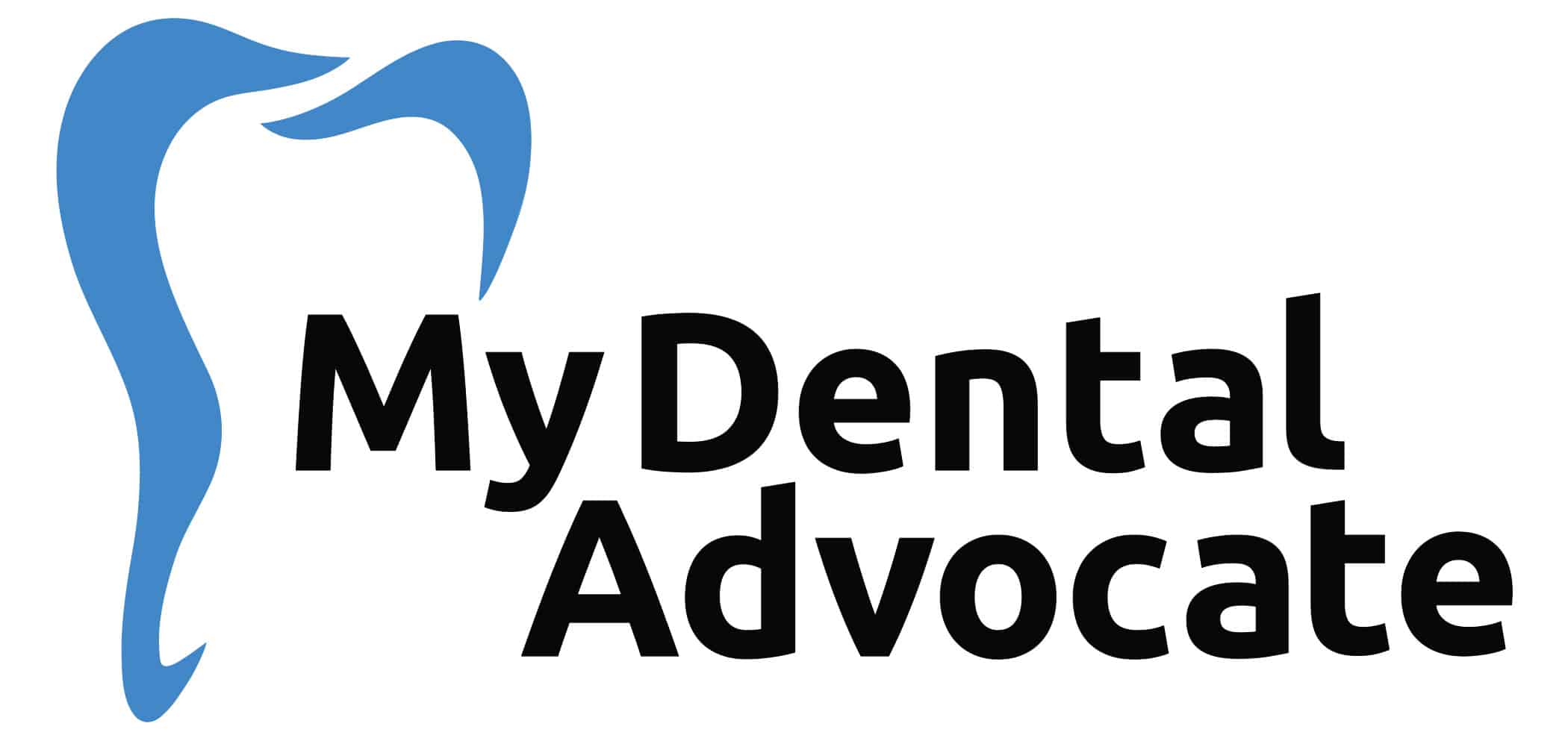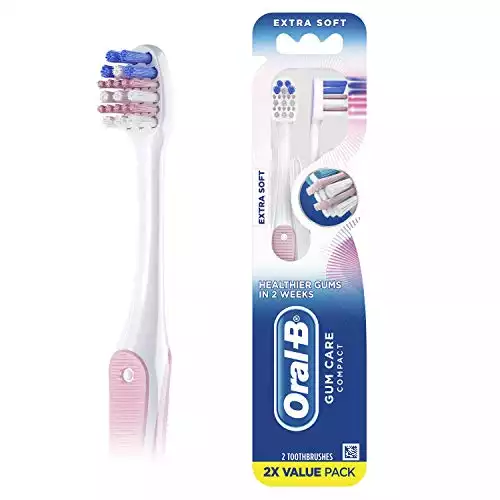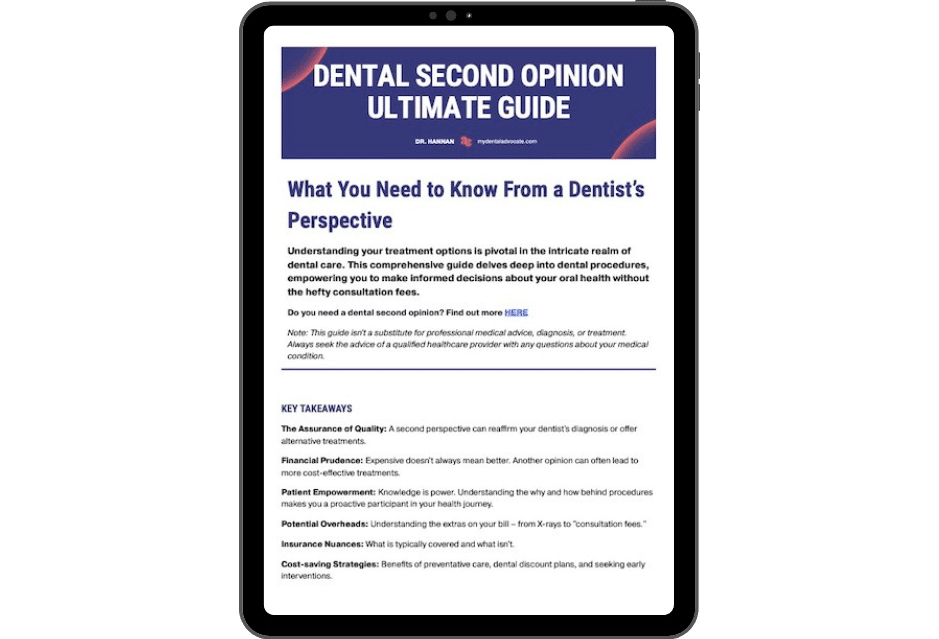Can Dental Implants Get Infected? (Common Signs & Symptoms)
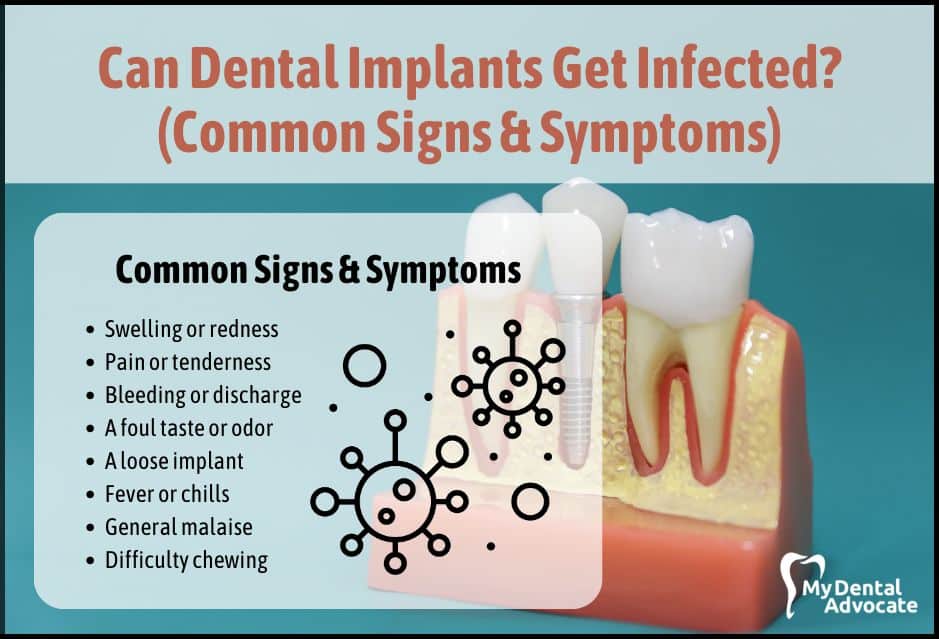
Imagine stepping out with a brand new, confident smile thanks to your dental implants.
But wait, did you know even these cutting-edge solutions can sometimes face an unexpected challenge – infections?
While it’s true that dental implants can become infected, just like natural teeth, there’s no need for panic.
Implant infections are relatively rare, and they’re quite treatable with timely intervention.
Need Dental Advice? Ask Dr. Hannan!
Can Dental Implants Get Infected?
Yes, Implant infections occur when bacteria infiltrate the area surrounding the implant, causing inflammation and damage to the surrounding tissue.
A dental implant infection, or peri-implantitis, is an inflammatory condition affecting the gum and bone around a dental implant. This infection can compromise the success of the implant and, if left untreated, may lead to implant failure.
Several possible causes of implant infections include poor oral hygiene, smoking, pre-existing gum disease, and a compromised immune system. Discussing your risk factors with your dentist before getting implants is important.
Dental implants are a popular and effective way to replace missing teeth. They are surgically implanted into your jawbone, fusing with the bone and providing a stable base for a replacement tooth.
Recommended Reading: Who is Not Suitable for Dental Implants? (Dentist’s Perspective)While dental implants are generally safe and have a high success rate, they can get infected.
Symptoms of Dental Implant Infection
If you have a dental implant, it’s important to know the signs of infection. So, what are the symptoms of a dental implant infection?
Key Symptoms
- Swelling or redness around the implant site
- Pain or tenderness around the implant site
- Bleeding or discharge from the implant site
- A foul taste or odor in your mouth
- A loose implant
- Fever or chills (in severe cases)
If you experience any of these symptoms, seeing your dentist as soon as possible is important. Dental implant infection is treatable at early stages.
Treatment methods include mechanical cleaning, antibacterial irrigation or surgical procedures.
Following your dentist’s instructions for caring for your implant is important to reduce infection risk.
This includes keeping the implant site clean and avoiding smoking, which can increase your risk of infection.
Causes of Dental Implant Infection
Bacteria
One of the primary causes of dental implant infection is bacteria. Bacteria can enter your mouth through food, drink, or even the air you breathe. Once inside your mouth, bacteria can grow and multiply, leading to an infection.
According to a recent study, bacterial infections have been reported to be a major risk factor for early and late loss of dental implants.
Poor Oral Hygiene
If you do not practice good oral hygiene, you are at a higher risk of developing a dental implant infection.
Poor oral hygiene can lead to plaque and bacteria buildup in your mouth, eventually leading to an infection.
Gum disease and other oral hygiene issues can increase the risk of osseointegration failure, which means additional corrective work or total implant failure.
Recommended Reading: The Dairy Dilemma: Can Consuming Dairy Products Impact Dental Implant Success?Smoking
Smoking can also increase your risk of developing a dental implant infection. Smoking weakens your immune system, making it harder for your body to fight infections.
Smoking can also restrict blood flow to your gums, slowing down the healing process after implant surgery.
Studies have reported a failure rate of implants in smokers compared to nonsmokers, ranging from 6.5% to 20%.
Medical Conditions
If you have certain medical conditions, such as diabetes or autoimmune diseases, you may be at a higher risk of developing a dental implant infection.
These conditions can weaken your immune system and make it harder for your body to fight infections.
Taking steps to reduce your risk of developing a dental implant infection is important. This includes practicing good oral hygiene, avoiding smoking, and informing your dentist of any medical conditions you may have.
By taking these steps, you can help ensure a successful implant procedure and reduce your risk of infection.
Preventing Dental Implant Infections
Good Oral Hygiene Practices
Maintaining good oral hygiene practices is one of the most effective ways to prevent dental implant infections.
This includes brushing your teeth twice daily with fluoride toothpaste and flossing daily to remove any food particles and bacteria trapped between your teeth and gums. You should also use an antibacterial mouthwash to kill any remaining bacteria in your mouth.
Recommendations
- Brush your teeth twice a day with a fluoride toothpaste
- Floss daily to remove any food particles and bacteria
- Use an antibacterial mouthwash to kill any remaining bacteria
Regular Dental Checkups
Regular dental checkups are essential for the health of your dental implants.
During your checkup, your dentist will examine your implants and check for any signs of infection or other issues. They will also clean your teeth and gums to remove any plaque and tartar that may have built up since your last visit.
Recommendations
- Visit your dentist regularly for checkups
- Have your implants examined for signs of infection or other issues
- Clean your teeth and gums to remove plaque and tartar buildup
Avoiding Smoking
Smoking can increase your risk of developing a dental implant infection. Smoking weakens your immune system, making it harder for your body to fight off infections. It can also reduce blood flow to your gums, slowing the healing process after implant surgery.
Recommendations
- Avoid smoking to reduce your risk of infection
- Smoking weakens your immune system
- Reduced blood flow to your gums can slow down the healing process
Treating Dental Implant Infections
If you have a dental implant infection, it’s important to seek treatment as soon as possible. Your dentist will determine the best course of action based on the severity of the infection.
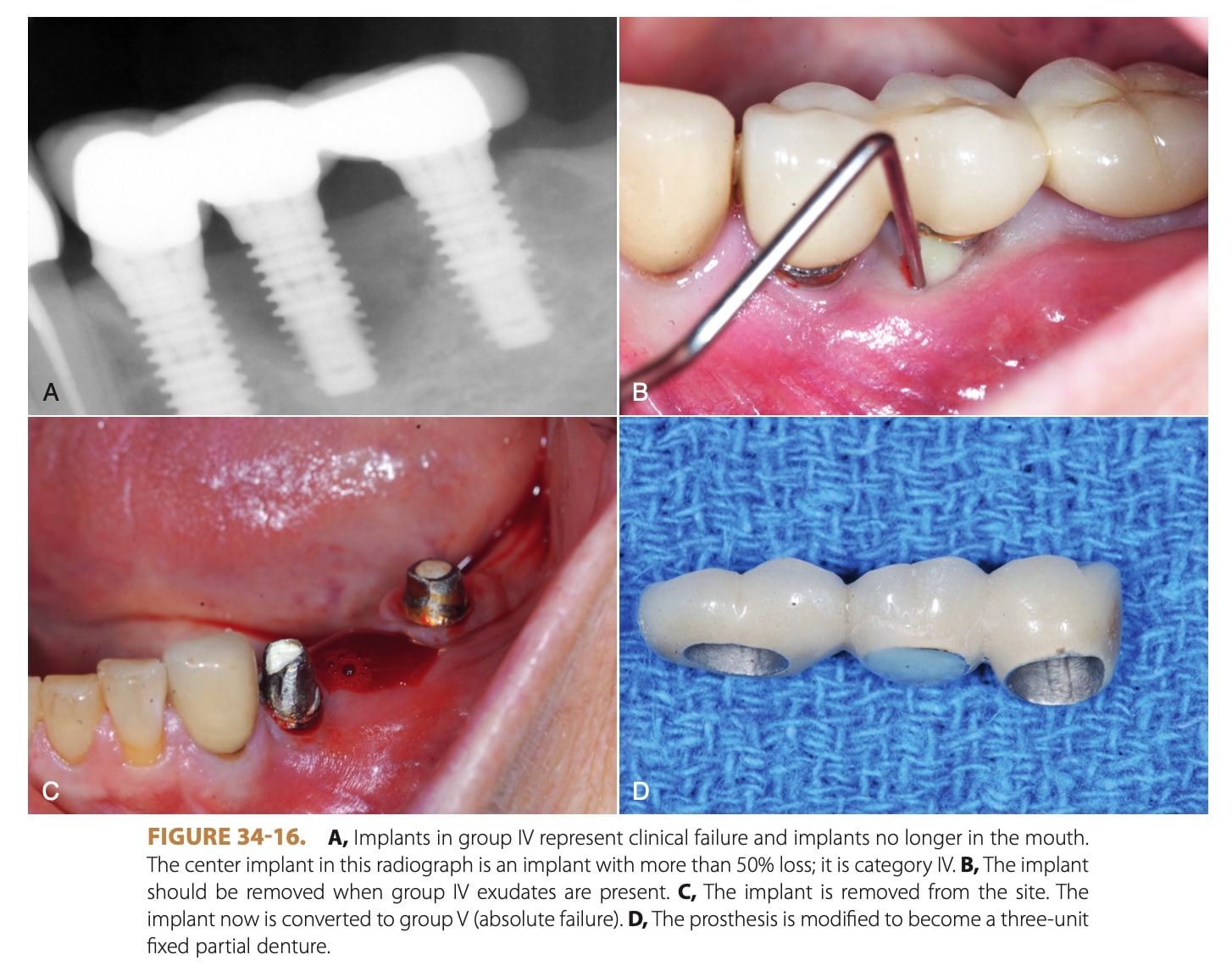
Antibiotics
If the infection is caught early, your dentist may prescribe antibiotics to help clear it up. Be sure to take the full course of antibiotics as directed, even if you start feeling better before you finish them.
Antibiotics can be taken orally or applied directly to the infected area. Your dentist will determine the best method based on the severity of the infection and your overall health.
Surgery
If the infection is more advanced, your dentist may need to perform surgery to remove the implant and clean the area.
This is usually a last resort, but preventing the infection from spreading may be necessary.
During the surgery, your dentist removes the implant and cleans the area thoroughly. They may also prescribe antibiotics to help prevent further infection.
Following your dentist’s instructions carefully after treatment is important to ensure a full recovery. This may include taking antibiotics, avoiding certain foods, and improving oral hygiene.
Contact your dentist immediately if you notice any signs of infection, such as swelling, bleeding, or pain around your dental implant. With prompt treatment, most dental implant infections can be successfully treated.
Dentist-Recommended Products
I recommend using these products to help you heal and recover faster after dental implant surgery.
The All Sett Health hands-free Hot and Cold compress is a perfect fit for everyone.
Made of gentle and lightweight wrap microfiber material, it comes with four reusable hot/cold gel packs that can be used whenever pain strikes. The built-in pockets allow you to snuggle two gel packs with two extra soft gel packs and hold them next to your face for additional security, relieving facial pain caused by toothaches or cosmetic surgery.
The Oral B Gum Care Extra-Soft Compact Head Toothbrush improves your gum health with ultra-soft bristles, which gently clean along the gumline and multilevel bristles clean deep between teeth. It has a compact head for superior reach to your back teeth.
The ultra-soft bristles are five times more gentle than a regular soft toothbrush and are perfect for those with sensitive teeth and gums.
In 1980, Dr. Perry Ratcliff founded Closys to replace ineffective and irritating oral rinses.
He formulated an extremely effective yet gentle oral rinse that a small group of dentists praised. Closys Oral Care was born and continues to create high-quality, comfortable oral rinses.
Their products are made in the USA and are free from alcohol, sulfates, and triclosan.
CloSYS Sensitive Toothpaste in Gentle Mint flavor promotes mouth health by fighting plaque buildup, restoring enamel, preventing cavities, and eliminating bad breath bacteria.
Formulated with fluoride, it strengthens, and restores weakened enamel for better protection against cavities and tooth sensitivity. CloSYS toothpaste products are SLS-free, triclosan-free, sulfate-free, and gluten-free, making them gentle and safe to use.
The pH-balanced formula is naturally activated to neutralize plaque bacteria and maintain a non-acidic environment in the mouth, providing long-lasting freshness and a healthy white smile without damaging or removing enamel.
Frequently Asked Questions (FAQ)
What are the symptoms of a dental implant infection?
Symptoms of a dental implant infection may include redness, swelling, pain, pus discharge, bad taste or odor in the mouth, and in some cases, fever. It’s essential to consult with your dentist if you suspect an infection.
How are dental implant infections treated?
Treatment for dental implant infections may involve antibiotics to fight the infection, thorough cleaning of the implant area, or, in severe cases, removal of the implant followed by re-implantation once the infection is cleared. The specific treatment plan depends on the severity of the infection and the dentist’s recommendation.
How can I prevent dental implant infections?
To prevent dental implant infections, practice good oral hygiene by brushing and flossing regularly, using antimicrobial mouthwashes, and attending routine dental check-ups. Additionally, maintaining a healthy lifestyle by avoiding tobacco products and managing conditions like diabetes can lower the risk of infection.
My Experience & Expertise
As a dentist, I have seen many patients with dental implants.
While dental implants are a safe and effective way to replace missing teeth, they are not immune to infections.
If you have dental implants, it is important to maintain good oral hygiene and visit your dentist regularly for check-ups and cleanings. Poor oral hygiene can lead to bacteria buildup, which can cause infections around your dental implants.
During your dental implant procedure, your dentist will provide instructions on caring for your implants. It is important to follow these instructions carefully to reduce your risk of infection.
Highlights
- Pain or discomfort around your dental implant
- Swelling or redness around your dental implant
- Bleeding around your dental implant
- A foul taste or odor in your mouth
- Fever or chills
Don’t hesitate to contact your dentist with any concerns about your dental implants. With proper care and maintenance, your dental implants can last a lifetime.
Need a second opinion? We can help! Learn more. Knowledge is power when cultivating healthy dental habits. The more informed you are, the better positioned you’ll be to prevent avoidable and potentially costly dental procedures for you and your family. Watch for future blog posts, where we’ll continue sharing important information, product reviews and practical advice!
Sources
- Korsch M. Microbiological findings in early and late implant loss: an observational clinical case-controlled study. BMC Oral Health. 2021.
- Kasat V. Smoking and dental implants. J Int Soc Prev Community Dent. 2012.

About the Author
Dr. Matthew Hannan, also known as “Dr. Advocate,” is a board-certified dentist on a mission to provide accurate dental patient education. He attended Baylor University before completing dental school at UT Health San Antonio School of Dentistry. He now lives in Arizona with his beautiful wife and 4 kids. Dr. Hannan believes everyone should access easy-to-read dental resources with relevant, up-to-date dental research and insight to improve their oral health.

Connect with Dr. Hannan!
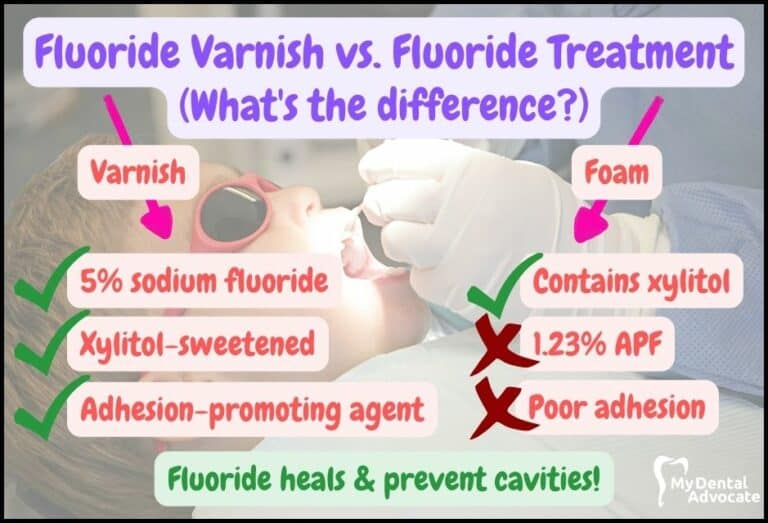
Fluoride Varnish vs. Fluoride Treatment (What’s the Difference?)
What’s the difference between fluoride varnish and fluoride treatment? Fluoride is a hot topic today, especially in the dental office. There are many questions about fluoride, including its effectiveness, safety and necessity. Is it safe for children? It’s so expensive; is it worth it?
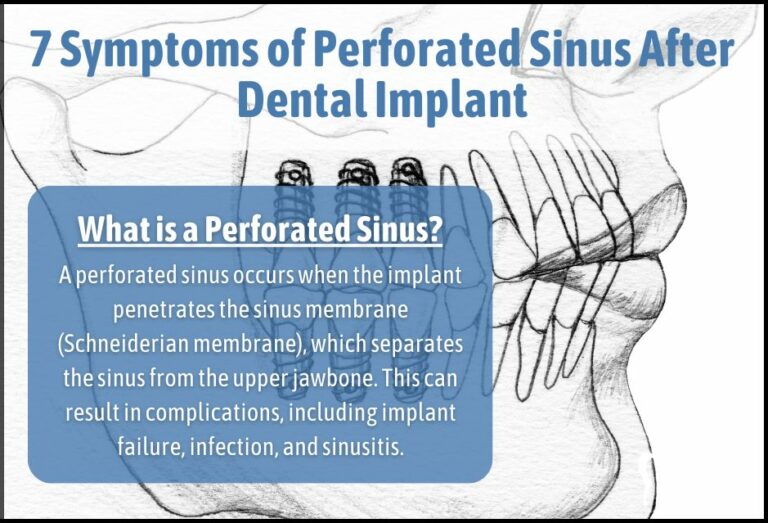
7 Symptoms of Perforated Sinus After Dental Implant
Dental implants are a popular solution for those seeking a lasting smile. Though complications are rare, it’s essential to stay informed about potential risks, such as sinus perforation. This minor concern is treatable, but knowing the symptoms is critical for a swift recovery.
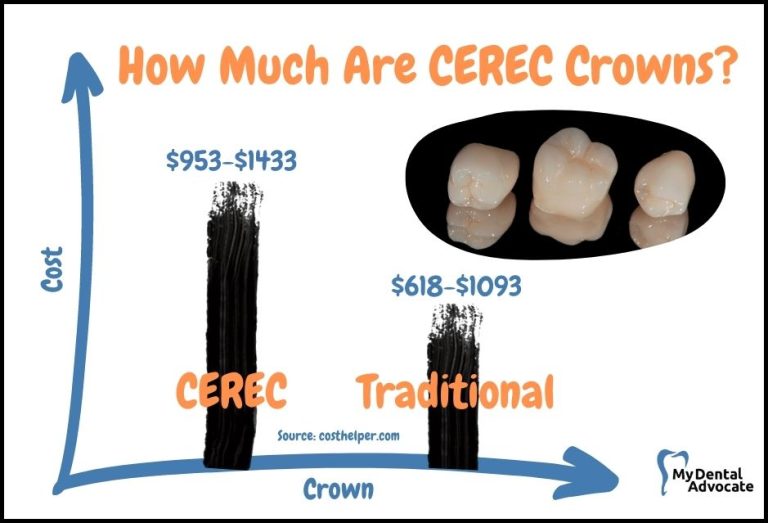
How Much Are CEREC Crowns? (Pros, Cons & Treatment Cost)
Treatment cost for CEREC crowns varies depending on where you live and the dentist’s credentials, but it is typically more expensive than getting traditional crowns. This blog post will discuss the pros and cons…
Gain Clarity with Our FREE Second Opinion Guide
Receive clear, expert second opinions online within 48 hours. Start today!
Product Reviews
Our 250+ dental product reviews (and counting), curated by an experienced dentist, are the most comprehensive online.
Toothbrush Genie
State-of-the-art chatbot designed to help you discover your perfect toothbrush in just a few simple steps!
Cavity Risk Assessment
Cutting-edge digital tool designed to evaluate your individual cavity risk based on your responses to a series of questions.
Gum Disease Assessment
Discover your gum disease risk with our quick and engaging 6-question assessment!
